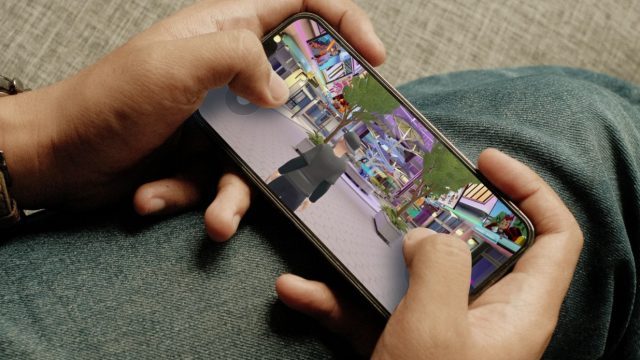Meta today announced a $50 million fund to incentivize the creation of new and improved content in Horizon Worlds, the company’s first-party social gaming platform. The move comes as many seasoned studios that build self-contained VR apps for the Quest platform are struggling to sustain themselves due to what Meta says is a shifting demographic of headset users.
Since the launch of Oculus Rift CV1 in 2016, self-contained VR apps have been the lifeblood of Meta’s VR platforms, and the primary driver of a growing audience of users over the years. And while these self-contained games and apps still largely define Meta’s XR platform, the company has come to believe that an all-encompassing ‘metaverse’ of connected experiences is the key to its success.
Horizon Worlds is Meta’s attempt at building the ‘metaverse’, where the platform serves as both a destination for playing and for building. Creators can build content inside of Horizon Worlds itself, then publish that content to the rest of the Horizon Worlds community. It’s all social by default, a critical element for one of the world’s largest social media companies.
But with Horizon Worlds available in VR for several years but not achieving a critical mass of users that could satisfy Meta’s desire for scale, the company eventually opened up Horizon Worlds to flatscreen devices like phones and computers with the goal of bringing more people onto the platform. While this invites a larger audience, it also makes the job of creators harder, given the challenge of satisfying the unique affordances of VR vs. those of flatscreen platforms.
And of course, one of the big hurdles to getting people using and returning to Horizon Worlds is straightforward: content. If there isn’t fun things to do with strong replayability, why would anyone keep coming back, let alone check out Horizon Worlds in the first place?
Meta has made some strides on content by attracting more and more creators to build for the platform and creating some of its own first-party games inside of Horizon Worlds.
Now the company is making another big bet to incentivize creators to build on Horizon Worlds; today it announced a $50 million ‘Creator Fund’ that will pay out to creators of worlds that drive high visits and retention.
“Each month, we’ll pay out bonuses from the Creator Fund to the makers of fun and engaging mobile and MR worlds. Bonuses will be tied to worlds’ contributions to the overall ecosystem across time spent, retention, and in-world purchases, so there are a variety of different ways for creators to maximize their earnings,” the company said in its announcement.
The fund comes alongside a new development tool, the Horizon Worlds desktop editor, which allows creators to build more extensive projects with the speed and power of their computer, rather than being inside a headset. It’s closer to the workflow of existing self-contained VR app developers, who generally build their apps using a game engine like Unity.

The move is in line with Meta’s growing conviction that Horizon Worlds is essential to its success in this space. Whether VR or not, Meta wants to build its own version of Fortnite—a social gaming platform with massive reach and retention.
Meta’s CTO recently told the teams working on XR and Horizon that the mobile version of Horizon Worlds “absolutely has to break out for our long term plans to have a chance.”
While the new $50 million creator fund is certainly a boon for creators who believe in Meta’s vision for Horizon Worlds, it comes at a tough time for developers of the self-contained VR and MR apps that have kept Meta’s headsets relevant.
The fund is the exclamation mark on the last two years which saw Meta pivot its VR platform to focus much more on Horizon Worlds. The company drastically reorganized its headset interface and mobile companion app—and even renamed them to reflect their new focus—to put Horizon Worlds content in front of more users. In some cases this meant pushing high-quality self-contained apps further from view, sometimes in favor of amatuer content of little value, or ‘cloned’ content that aims to recreate the gameplay of a successful self-contained VR app inside of Horizon Worlds.
A widespread feeling among those third-party developers at the moment is that these changes have significantly harmed their businesses, which rely on sales of their apps to continue supporting existing content and to create new content. The feeling is that Meta is funneling customers away from their apps and onto its own sub-platform (where Meta takes an even more aggressive cut of creator revenue).
A growing list of longstanding studios that have built well received self-contained VR apps have been made significant cuts to staff and footprint, citing the dual challenges of sluggish performance on Meta’s Quest platform and broader distress in the overall gaming industry. Meta even closed one of its own studios that was focused on high-production self-contained VR games.
That’s not to say that Meta hasn’t invested in developers of self-contained VR games & apps over the years.
The company has disbursed hundreds of millions of dollars for the purpose of building alluring VR content, and has aimed to accelerate small indie developers with programs like Oculus Start.
Last year the company created a “multi-million dollar” fund to incentivize new studios to try their hand at creating MR content for Quest, and a similar fund aimed at developers building ‘lifestyle’ apps for Quest headsets.
However, many developers are left with a feeling that even if they have found a sustainable audience for now, Meta’s shifting focus—whether from VR to MR, or MR to Horizon Worlds—makes the Quest platform a volatile and risky place to do business.
For its part, Meta counters that the fading fortunes of some self-contained VR app developers is due not to frequent pivots, but to a demographic shift of Quest users which has seen growing demand for free-to-play apps over paid apps
And indeed, there’s probably some truth to that. Despite being ‘free to play’, Gorilla Tag has become one of VR’s most successful titles ever, reeling in more than $100 million in revenue through in-app purchases. The studio credits its free-to-play model as a major factor in that success, with the low barrier to entry helping to achieve a critical mass of player population.
Other VR apps building on the free-to-play model are also seeing positive signs of momentum, like Digigods, which recently raised $2.6 million in funding to expand thanks for strong growth from players responding to social, free-to-play, and user-generated content.
Meta maintains that paid VR apps will continue to be important to its Horizon platform. The company says it’s continuing existing its usual funding activities for self-contained VR content (though recent reports contest that notion).







